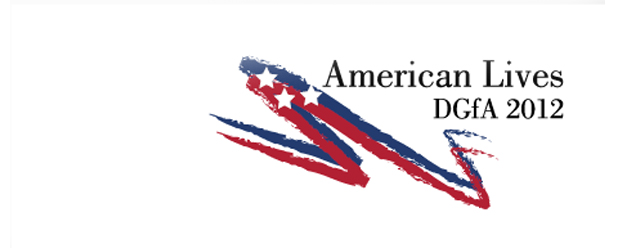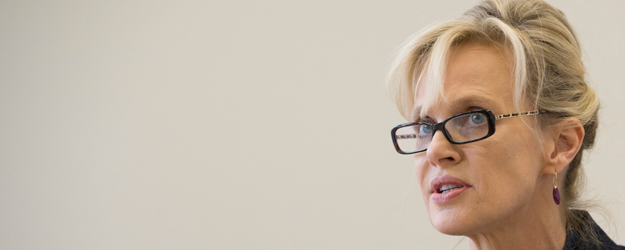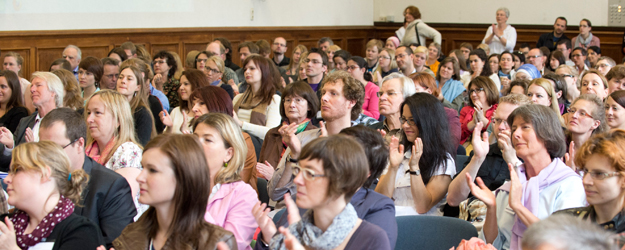11 June 2012
She read from her books and tirelessly discussed and debated with experts from various disciplines. The famous US-American author Siri Hustvedt was the star guest of the 59th annual conference of the German Association for American Studies at Johannes Gutenberg University Mainz (JGU). However, she was not the only one with something to say to the more than 300 guests from around the world. Seventy-six speakers gave presentations on the conference theme "American Lives."
Siri Hustvedt's summary of the conference is brief but to the point: "It is exhilarating to hear people tell me something new," the internationally bestselling author says. The other participants and organizers of Hustvedt's visit to Mainz likely found it similarly exhilarating. "She spoke with students until late in the evening," tells Professor Dr. Alfred Hornung. And, with the entire program in view, he adds, "That everything came together so well was something we could not have anticipated beforehand."
An author full of energy
Hornung's American Studies division at the Department of English Literature and Linguistics at JGU organized the 59th Annual Conference of the German Association for American Studies with its core theme of "American Lives." The conference also marked the 60th anniversary of the establishment of a North American Studies department at JGU. At the end of the last day of the conference, some of Hornung's team looked tired from all the work they had invested. But Hustvedt was still overflowing with energy. She continued to write dedications in books written by her and answer questions at conference pauses while others took the opportunity to fuel up on coffee and cakes.
Life Writing, i.e., (auto)biographical writing in its various forms, was the focus of the conference. Hillary Clinton’s autobiography was discussed as were the memoirs of immigrants and blogs from the Iraq war. In 2009, a "Life Writing" international doctoral college was established at JGU, so the conference theme already had a distinct resonance in Mainz.
"The Summer Without Men" - A comedy without men
Mia Fredricksen's husband, Boris, decides he needs a pause in their relationship after 30 years of marriage: "The pause was French with limp but shiny brown hair. She had significant breasts that were real, not manufactured, narrow rectangular glasses, and an excellent mind." In addition, the 'pause' is 20 years younger than Mia. As a result, Mia descends into mental depression: "In the end, Dr. P. diagnosed me with Brief Psychotic Disorder, also known as Brief Reactive Psychosis, which means that you are genuinely crazy but not for long. If it goes for more than a month, you need another label."
In The Summer Without Men, Siri Hustvedt shows that she also has a talent for humorous writing. She gave an introduction to the novel and her new volume of essays entitled Living, Thinking, Looking. For the readings, the conference participants relocated from the Alte Mensa location on the JGU campus to the Baroque-style hall in the Chamber of Commerce and Industry (IHK) on Mainz's Schillerplatz.
A language full of clarity
Hustvedt's language is very clear and transparent: "Lucidity" is important to her, she claims. And this is all the more remarkable in view of the fact that this American author with her part-Norwegian ancestry constantly ventures into areas that are not necessarily particularly clear-cut. Aspects of neurology, psychiatry, and psychology play a major role in her books. She is one of the few authors who are considered by specialists in these fields to genuinely understand what they are writing about. In 2011, for example, she was invited to take part in a public discussion with the neurologist António Damásio.
Mia's 'summer without men' provides Hustvedt with the opportunity for an analytical tour de force in which she considers the history of gender studies. With delicate irony, she dismantles the stereotypes created by the mainly male research community. In 1786, Paul-Victor de Sèze expressed concern that women could endanger their fertility by thinking too much. Hustvedt characterizes this as the "thought-shrivels-your-ovaries theory."
No categorizing of gender
She has identified irrational ways of pigeonholing males and females that have survived into the present: Women are assumed to have social skills, a talent for languages, and a need for security. Men, on the other hand, think logically, are aggressive, and tend to be mathematically gifted. "It is not that there is no difference between men and women," says Hustvedt, "it is how much difference the difference makes, and how we choose to frame it."
She has identified irrational ways of pigeonholing males and females that have survived into the present: Women are assumed to have social skills, a talent for languages, and a need for security. Men, on the other hand, think logically, are aggressive, and tend to be mathematically gifted. "It is not that there is no difference between men and women", so Hustvedt, "it is how much difference the difference makes, and how we choose to frame it."
This concept forms the basis of her conference lecture "First, Second, and Third Person Adventures in Crossing Disciplines": The first person, the I, is not allowed to play a role in academic texts, laments Hustvedt. But it is precisely this I, with its subjectivity and need for socialization, that is a major factor feeding our impulse to undertake research. However, even here dualities dominate that are firmly rooted in the thought processes of Western philosophy: emotion vs. reason, body vs. spirit, warm vs. cold, woman vs. man. Hustvedt does not like these categorizations. "Break them down," she proposes.
An author and her fans
Irrespective of whether she was reading or lecturing, Hustvedt attracted an extensive audience of fans, and she continued to chat in a relaxed way to everyone - until the next item on the agenda came up. The podium discussion "Life Sciences and Life Writing" was supposed to be the final event of the conference and was also designed to create a bridge between the humanities and the natural sciences, between (auto)biographical writing and the life sciences.
"The other day, a boy came to our Medical Center. His grandmother had managed to save him from sudden infant death syndrome but he suffered severe brain damage as a result. Although his brain tissue is slowly deteriorating, his biological death is not yet in sight." Professor Dr. Norbert Paul, Director of the Institute of the History, Philosophy, and Ethics of Medicine at the Mainz University Medical Center tells of the boy's fate and explains that for him as a medical practitioner the one thing that is missing is the story of the boy's life that goes beyond just the aspects of his medical history. And it is here that humanities scholars in the form of live writing can provide input for decision-making that is not solely based on a materialistic view of the patient as a physical entity.
In the end is the beginning
Hustvedt uses this combination of natural sciences and narrative in many of her books. The podium discussion between a panel consisting of four American Studies scholars, the author, and two life scientists became particularly lively. Hustvedt would like specialists, as well as authors, to look and see beyond their own noses. "Anyone who writes a novel about an Alzheimer's patient will not be taken seriously if they fail to take into account the latest research," she states, and goes on to describe what she sees as the ideal situation: "This would be when people finally get involved in other disciplines."
The end of the "American Lives" conference seemed itself to be making progress in that direction. Such final discussions are often poorly attended; participants like to leave early to take advantage of better travel connections. But that was not the case here. No one really wanted to leave. And Siri Hustvedt herself stayed and responded to a whole lot of final questions.



